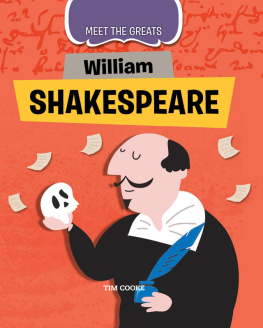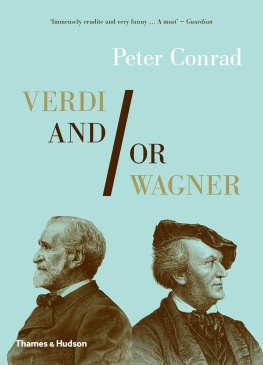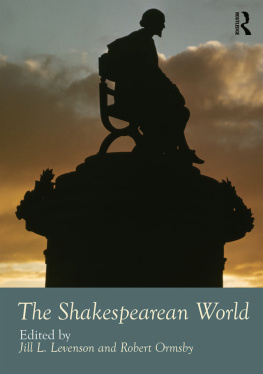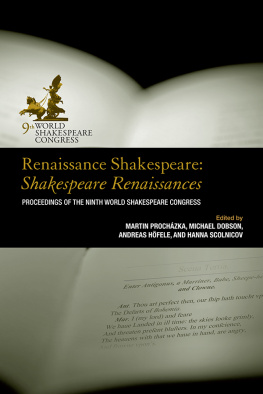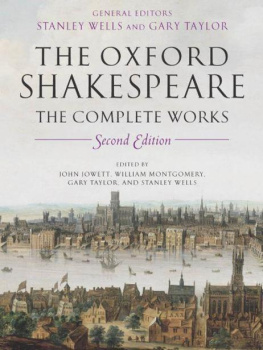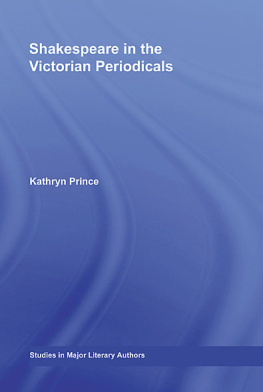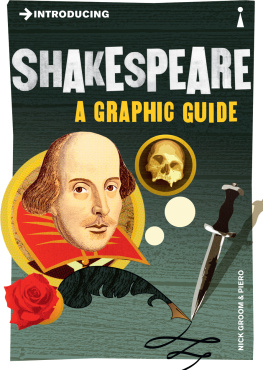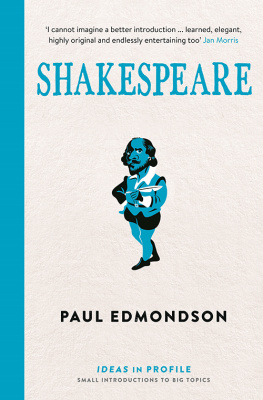Berlioz, Verdi, Wagner, Britten
Great Shakespeareans
Volume XI
Great Shakespeareans
Each volume in the series provides a critical account and analysis of those figures who have had the greatest influence on the interpretation, understanding and cultural reception of Shakespeare, both nationally and around the world.
General Series Editors:
Peter Holland, University of Notre Dame, USA
Adrian Poole, Trinity College Cambridge, UK
Editorial Advisory Board:
David Bevington (University of Chicago, USA), Michael Cordner (University of York, UK), Michael Dobson (Birkbeck College, University of London, UK), Dominique Goy-Blanquet (University of Picardy, France), Barbara Hodgdon (University of Michigan, USA), Andreas Hfele (University of Munich, Germany), Tetsuo Kishi (Kyoto University, Japan), Russ McDonald (Goldsmiths College, University of London, UK), Ruth Morse (University of Paris 7, Denis Diderot, France), Michael Neill (University of Auckland, New Zealand), Stephen Orgel (Stanford University, USA), Carol Rutter (University of Warwick, UK), Ann Thompson (Kings College, University of London, UK) and Paul Yachnin (McGill University, Canada).
Great Shakespeareans: Set I
Volume I: Dryden, Pope, Johnson, Malone, edited by Claude Rawson
Volume II: Garrick, Kemble, Siddons, Kean, edited by Peter Holland
Volume III: Voltaire, Goethe, Schlegel, Coleridge, edited by Roger Paulin
Volume IV: Hazlitt, Keats, the Lambs, edited by Adrian Poole
Great Shakespeareans: Set II
Volume V: Scott, Dickens, Eliot, Hardy, edited by Adrian Poole
Volume VI: Macready, Booth, Irving, Terry, edited by Richard Schoch
Volume VII: Jameson, Cowden Clarke, Kemble, Cushman, edited by Gail Marshall
Volume VIII: James, Melville, Emerson, Berryman, edited by Peter Rawlings
Volume IX: Bradley, Greg, Folger, edited by Cary DiPietro
Great Shakespeareans: Set III
Volume X: Marx and Freud, Crystal Bartolovich, Jean Howard and David Hillman
Volume XI: Berlioz, Verdi, Wagner, Britten, edited by Daniel Albright
Volume XII: Joyce, T. S. Eliot, Auden, Beckett, edited by Adrian Poole
Volume XIII: Empson, Wilson Knight, Barber, Kott, edited by Hugh Grady
Great Shakespeareans: Set IV
Volume XIV: Hugo, Pasternak, Brecht, Csaire, edited by Ruth Morse
Volume XV: Poel, Granville Barker, Guthrie, Wanamaker, edited by Cary Mazer
Volume XVI: Gielgud, Olivier, Ashcroft, Dench, edited by Russell Jackson
Volume XVII: Welles, Kozintsev, Kurosawa, Zeffirelli, Mark Thornton Burnett, Kathy Howlett, Courtney Lehmann and Ramona Wray
Volume XVIII: Hall, Brook, Ninagawa, Lepage, edited by Peter Holland
Berlioz, Verdi, Wagner, Britten
Great Shakespeareans
Volume XI
Edited by
Daniel Albright

Contents
Peter Holland and Adrian Poole
Daniel Albright
Peter Bloom
Daniel Albright
David Trippett
Seth Brodsky
What is a Great Shakespearean? Who are the Great Shakespeareans? This series is designed to explore those figures who have had the greatest influence on the interpretation, understanding and reception of Shakespeare, both nationally and internationally. Charting the effect of Shakespeare on cultures local, national and international is a neverending task, as we continually modulate and understand differently the ways in which each culture is formed and altered. Great Shakespeareans uses as its focus individuals whose own cultural impact has been and continues to be powerful. One of its aims is to widen the sense of who constitute the most important figures in our understanding of Shakespeares afterlives. The list is therefore not restricted to, say, actors and scholars, as if the performance of and commentary on Shakespeares works were the only means by which his impact is remade or extended. There are actors aplenty (like Garrick, Irving and Olivier) and scholars too (Bradley, Greg and Empson) but our list deliberately includes as many novelists (Dickens, Melville, Joyce), poets (Keats, Eliot, Berryman), playwrights (Brecht, Beckett, Csaire) and composers (Berlioz, Verdi and Britten), as well as thinkers whose work seems impossible without Shakespeare and whose influence on our world has been profound, like Marx and Freud.
Deciding who to include has been less difficult than deciding who to exclude. We have a long list of individuals for whom we would wish to have found a place but whose inclusion would have meant someone elses exclusion. We took long and hard looks at the volumes as they were shaped by our own and our volume editors perceptions. We have numerous regrets over some outstanding figures who ended up just outside this project. There will, no doubt, be argument on this score. Some may find our choices too Anglophone, insufficiently global. Others may complain of the lack of contemporary scholars and critics. But this is not a project designed to establish a new canon, nor are our volumes intended to be encyclopedic in scope. The series is not entitled The Greatest Shakespeareans nor is it Some Great Shakespeareans, but it will, we hope, be seen as negotiating and occupying a space mid-way along the spectrum of inclusivity and arbitrariness.
Our contributors have been asked to describe the double impact of Shakespeare on their particular figure and of their figure on the understanding, interpretation and appreciation of Shakespeare, as well as providing a sketch of their subjects intellectual and professional biography and an account of the wider context within which her/his work might be understood. This context will vary widely from case to case and, at times, a single Great Shakespearean is asked to stand as a way of grasping a large domain. In the case of Britten, for example, he is the window through which other composers and works in the English musical tradition like Vaughan Williams, Walton and Tippett have a place. So, too, Dryden has been the means for considering the beginnings of critical analysis of the plays as well as of the ways in which Shakespeares plays influenced Drydens own practice.
To enable our contributors to achieve what we have asked of them, we have taken the unusual step of enabling them to write at length. Our volumes do not contain brief entries of the kind that a Shakespeare Encyclopedia would include nor the standard article length of academic journals and Shakespeare Companions. With no more than four Great Shakespeareans per volume and as few as two in the case of volume 10 our contributors have space to present their figures more substantially and, we trust, more engagingly. Each volume has a brief introduction by the volume editor and a section of further reading. We hope the volumes will appeal to those who already know the accomplishment of a particular Great Shakespearean and to those trying to find a way into seeing how Shakespeare has affected a particular poet as well as how that poet has changed forever our appreciation of Shakespeare. Above all, we hope Great Shakespeareans will help our readers to think afresh about what Shakespeare has meant to our cultures, and about how and why, in such differing ways across the globe and across the last four centuries and more, they have changed what his writing has meant.
Peter Holland and Adrian Poole
Next page

